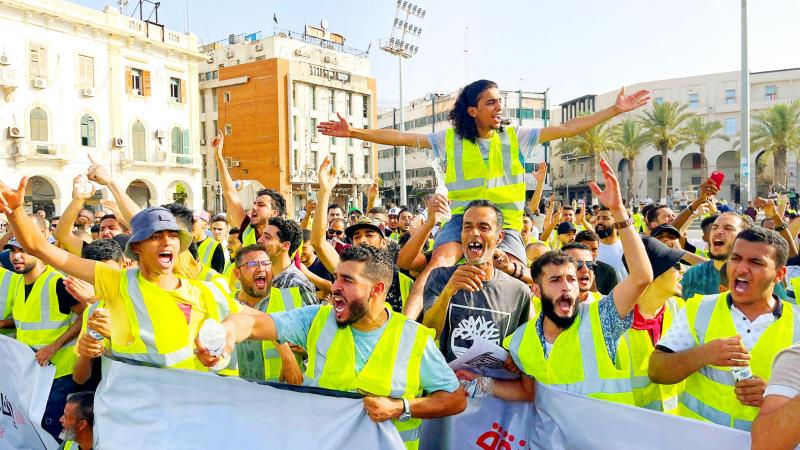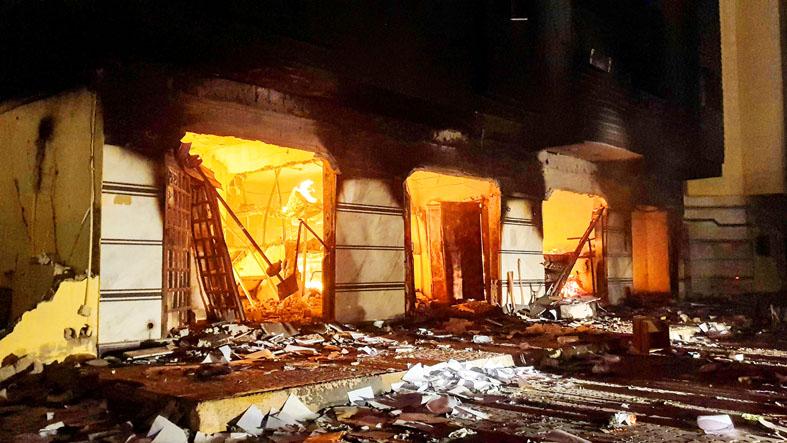Protesters on Friday stormed the Libyan House of Representatives building in the eastern city of Tobruk, demonstrating against deteriorating living conditions and political deadlock, Libyan media reported.
Several television channels said that protesters managed to penetrate the building and committed acts of vandalism, while media outlets showed images of thick columns of black smoke coming from its perimeter, as angry young demonstrators burned tires.
Other media reports said that part of the building had been burned.

Photo: Reuters
The building was empty, as Friday is on the weekend in Libya.
The House of Representatives has been based in Tobruk, hundreds of kilometers east of the capital, Tripoli, since an east-west schism in 2014 following a revolt that toppled former Libyan leader Muammar Qaddafi three years earlier.
A rival body known as the High Council of State is based in Tripoli.

Photo: AFP
Images on Friday showed that a protester driving a bulldozer had smashed through part of a gate, allowing other demonstrators to enter more easily, while vehicles of officials were set on fire.
Later, protesters began to break through the building’s walls with construction equipment.
Others, some brandishing the green flags of the Qaddafi regime, threw office documents into the air.
While recognizing “the right of citizens to demonstrate peacefully,” the legislature condemned “acts of vandalism and the burning” of its headquarters.
Interim Libyan Prime Minister Abdulhamid Dbeibah wrote on Twitter that he would add his voice to those of the protesters and call for elections.
Libya has endured several days of power cuts, worsened by the blockade of several oil facilities against the backdrop of political rivalries.
“We want the lights to work,” protesters chanted.
Two governments have been vying for power for months: One based in Tripoli, led by Dbeibah, and another headed by former minister of the interior Fathi Bashagha, appointed by the legislature and supported by eastern-based Libyan Field Marshal Khalifa Haftar.
“I call on my parliamentary colleagues as well as members of the High Council of State to collectively resign to respect the will of the Libyan people and preserve Libya’s stability,” Libyan Representative Ziad Dgheim was quoted as saying by Libyan channel al-Ahrar on Friday.
Libyan Representative Balkheir Alshaab said that “we must recognize our failure and immediately withdraw from the political scene.”
Presidential and parliamentary elections, originally set for December last year, were meant to cap a UN-led peace process following the end of the last major round of violence in 2020. The vote never took place due to several contentious candidacies and deep disagreements over the polls’ legal basis between rival power centers in the east and west.
The UN on Thursday said that talks between the rival Libyan institutions aimed at breaking the deadlock had failed to resolve key differences.
Libyan Speaker of the House of Representatives Aguila Saleh and High Council of State President Khaled al-Mishri met at the UN in Geneva for three days to discuss a draft constitutional framework for elections.
While some progress was made, it was not enough to move forward toward elections, with the two sides still at odds over who can stand in presidential elections, said UN Deputy Special Representative for Political Affairs in Libya Stephanie Williams, who facilitated the talks.
The prospect of elections appears as distant as ever since the House of Representatives, elected in 2014, appointed Bashagha, arguing that Dbeibah’s mandate had expired.
After Bashagha failed to enter Tripoli in an armed standoff in May, the rival administration took up office further east in Sirte, Qaddafi’s hometown.
Over the past few weeks, repeated skirmishes have occurred between armed groups in Tripoli, prompting fears of a return to full-scale conflict.
Protests took place in other Libyan cities on Friday including Tripoli, where demonstrators held images of Dbeibah and Bashagha crossed out.
“Popular protests have erupted across Libya in exasperation at a collapsing quality of life, the entire political class who manufactured it, and the UN who indulged them over delivering promised change,” European Council of Foreign Relations senior policy fellow Tarek Megerisi wrote on Twitter.
“Things are escalating quickly and the response will define Libya’s summer,” he added.

A fire caused by a burst gas pipe yesterday spread to several homes and sent a fireball soaring into the sky outside Malaysia’s largest city, injuring more than 100 people. The towering inferno near a gas station in Putra Heights outside Kuala Lumpur was visible for kilometers and lasted for several hours. It happened during a public holiday as Muslims, who are the majority in Malaysia, celebrate the second day of Eid al-Fitr. National oil company Petronas said the fire started at one of its gas pipelines at 8:10am and the affected pipeline was later isolated. Disaster management officials said shutting the

US Vice President J.D. Vance on Friday accused Denmark of not having done enough to protect Greenland, when he visited the strategically placed and resource-rich Danish territory coveted by US President Donald Trump. Vance made his comment during a trip to the Pituffik Space Base in northwestern Greenland, a visit viewed by Copenhagen and Nuuk as a provocation. “Our message to Denmark is very simple: You have not done a good job by the people of Greenland,” Vance told a news conference. “You have under-invested in the people of Greenland, and you have under-invested in the security architecture of this

Japan unveiled a plan on Thursday to evacuate around 120,000 residents and tourists from its southern islets near Taiwan within six days in the event of an “emergency”. The plan was put together as “the security situation surrounding our nation grows severe” and with an “emergency” in mind, the government’s crisis management office said. Exactly what that emergency might be was left unspecified in the plan but it envisages the evacuation of around 120,000 people in five Japanese islets close to Taiwan. China claims Taiwan as part of its territory and has stepped up military pressure in recent years, including

UNREST: The authorities in Turkey arrested 13 Turkish journalists in five days, deported a BBC correspondent and on Thursday arrested a reporter from Sweden Waving flags and chanting slogans, many hundreds of thousands of anti-government demonstrators on Saturday rallied in Istanbul, Turkey, in defence of democracy after the arrest of Istanbul Mayor Ekrem Imamoglu which sparked Turkey’s worst street unrest in more than a decade. Under a cloudless blue sky, vast crowds gathered in Maltepe on the Asian side of Turkey’s biggest city on the eve of the Eid al-Fitr celebration which started yesterday, marking the end of Ramadan. Ozgur Ozel, chairman of the main opposition Republican People’s Party (CHP), which organized the rally, said there were 2.2 million people in the crowd, but